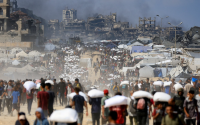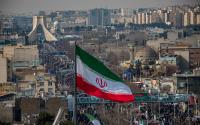US marines waiting to attack the Iraqi city of Falluja were told that they were poised to take part in their biggest urban assault since the recapture of the South Vietnamese city of Hue after the Tet offensive in 1968. It is not a comparison that will help dispel worries across the world about the battle, which looks like writing another fateful chapter in an already grim story, and one which is far from guaranteed to have the happy end that has been promised. US commanders and Ayad Allawi, Iraq's interim prime minister, insist that the operation, which was under way last night, is needed to flush out "terrorists, former Ba'athists, murderers and thugs" from this centre of Sunni resistance. The aim - backed by Tony Blair and aided by the controversial and dangerous deployment of the Black Watch to the area - is to "pacify" Falluja before January's elections, the centrepiece of the US-British exit strategy and of hopes that post-Saddam Iraq can progress towards democracy and stability despite the current mayhem.
No one seriously doubts the outcome of this long-heralded onslaught. US F16 fighter bombers, Cobra helicopters, heavy artillery and tanks are more than a match for a few thousand insurgents, including foreign fighters of the notorious Abu Musab al-Zarqawi group, who are armed with light weapons and on past form are prepared to sacrifice themselves in suicide bombings. The question is what the cost, and the effect, of "victory" will be. Critics of the US have already written it off as a war crime, pointing to the heavy casualties after the murder of American guards earlier this year and the effect of 500lb bombs on the 30,000 civilians who are still estimated to be in the city on the Euphrates.
Washington and London are sharply aware of the criticism voiced last week by Kofi Annan, the UN secretary-general, who warned that attacking Falluja could undermine the very process it is supposed to facilitate by alienating yet more ordinary Iraqis. Mr Annan got short shrift from Mr Allawi, who crudely suggested that the UN chief solve the problem himself. But there are other discordant voices: Ghazi al-Yawar, the interim Iraqi president and a prominent Sunni tribal leader, signalled that the effect could prove fatal to hopes for his community's participation in the democratic process. Javier Solana, the EU's foreign policy chief, publicly questioned whether the elections would indeed be able to go ahead on schedule, all but accusing Mr Allawi of deliberately distorting the picture. And there can clearly be no certainty that whatever constitutes success in Falluja will halt the devastating attacks on Iraqis working for the interim government and its security forces, as demonstrated by yet another suicide bombing in Baghdad yesterday.
It is already possible to glimpse the future through the smoke of this battle: the military operation was formally authorised by Mr Allawi, while a deliberate effort is being made to play up the role of Iraqi troops - prompting wry reflections on the speed with which the Saddam-era army was disbanded by the occupation authorities last year. It is also alarming to consider that the government is using emergency powers, like so many other Arab regimes, that would have been normal in the bad old Ba'athist days. It is important to remember that most of what we will know about the fighting will come from journalists embedded with the US forces, while we will inevitably hear less about what it feels like to be on the receiving end of their vastly superior firepower. Reports last night referred to victims being buried in graves in Falluja's municipal soccer stadium, in a grim echo of the siege of Sarajevo. The most we can probably hope for is that this Iraqi battle will be fought with care, restraint and speed. But there are precious few grounds for optimism that it will.
http://www.guardian.co.uk./print/0,3858,5058159-103550,00.html






